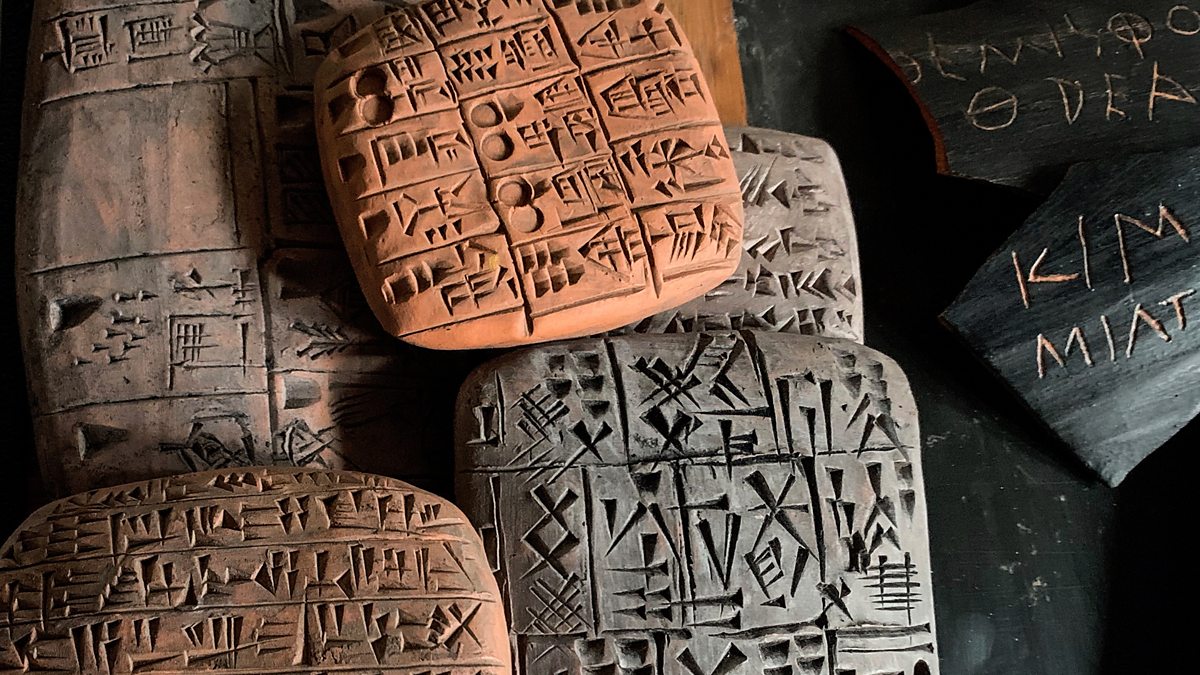I have to say that I was starting from a long way back in BBC4's 'The Secret History of Writing', but I have been finding it fascinating. Part One explored ancient Aboriginal dream paintings, Hieroglyphics, Sumerian and Chinese Script, and Rebus Principle, showing the move from pictures to alphabet. Last night's episode covered papyrus, parchment and paper, including the writing technology; and then Gutenberg's printing press in Mainz and it's crucial role in the move out of the Middle Ages. I sat throughout thinking how little I knew about writing, and how well it was explained. Very enjoyable series indeed, so far. Only thing missing...still don't know why some cultures write top to bottom, some left to right, some right to left...maybe there isn't a reason!
Secret History of Writing on BBC4
Collapse
Announcement
Collapse
No announcement yet.
X
-
Yes, loved the first one and looking forward to the second.Originally posted by johncorrigan View PostI have to say that I was starting from a long way back in BBC4's 'The Secret History of Writing', but I have been finding it fascinating. Part One explored ancient Aboriginal dream paintings, Hieroglyphics, Sumerian and Chinese Script, and Rebus Principle, showing the move from pictures to alphabet. Last night's episode covered papyrus, parchment and paper, including the writing technology; and then Gutenberg's printing press in Mainz and it's crucial role in the move out of the Middle Ages. I sat throughout thinking how little I knew about writing, and how well it was explained. Very enjoyable series indeed, so far. Only thing missing...still don't know why some cultures write top to bottom, some left to right, some right to left...maybe there isn't a reason!
https://www.bbc.co.uk/programmes/m000mtml
I was particularly fascinated by the explanation of how certain Egyptian hieroglyphs morphed into the alphabetical characters we use today, thanks to Canaanite migrant workers helping Ancient Egyptians mine for turquoise in Sinai c2000BC...."...the isle is full of noises,
Sounds and sweet airs, that give delight and hurt not.
Sometimes a thousand twangling instruments
Will hum about mine ears, and sometime voices..."
-
I also found that amazing, Nick...and the fact that the Rebus Principle happened across the World from Egypt to China to the Americas...it was inevitable, in their words. Never heard of it before!Originally posted by Nick Armstrong View Post
I was particularly fascinated by the explanation of how certain Egyptian hieroglyphs morphed into the alphabetical characters we use today, thanks to Canaanite migrant workers helping Ancient Egyptians mine for turquoise in Sinai c2000BC....
Comment
-
Originally posted by gradus View PostTremendously interesting programme. The American calligrapher was fascinating and his work exquisite. I had thought that stretched animal skins used for writing were called vellum but apparently its parchment. A must-watch.
And.... OMG (as they say): the strictly literal origin of “spine of a book”...
(It had never occurred to me before )
"...the isle is full of noises,
)
"...the isle is full of noises,
Sounds and sweet airs, that give delight and hurt not.
Sometimes a thousand twangling instruments
Will hum about mine ears, and sometime voices..."
Comment
-
Although not as stop-you-in-your-tracks revelatory as the previous episode, part three of this riveting series still had so much food for thought. Ataturk changing the Turkish script from Arabic to Latin gave the Turks the vowels they needed, but others, who saw the Arabic script as containing mysterious messages from heaven lost touch with their history. I loved the scribe saving his pencil shavings and unused paper to be burned at the time of death. I would like to paint Chinese letters in water on pavements, but doubt that I have the muscle memory, but you could see how important the Chinese writing system was to their people...in it is contained their history, culture and traditions. But Arabic and Chinese are struggling with the move to tablets and the like...I hadn't heard of Pinyin, but critics feared that it would lead to losing the ability to write the Chinese characters.
I have loved this series, and while not wishing to downplay the other two, episode two is one of the best documentaries I have seen in years.
Comment

Comment